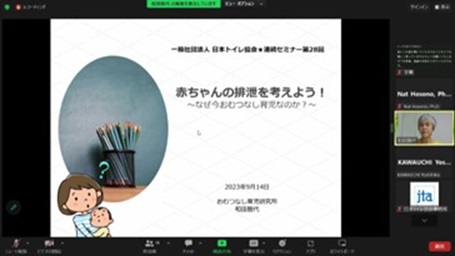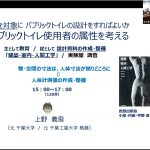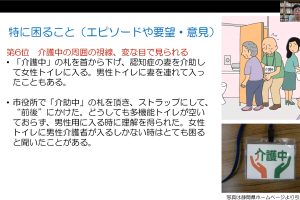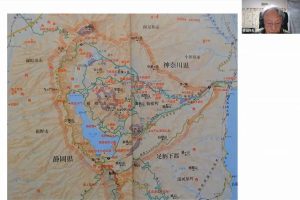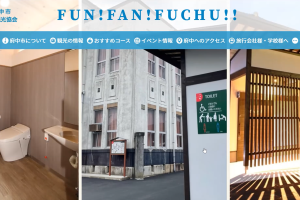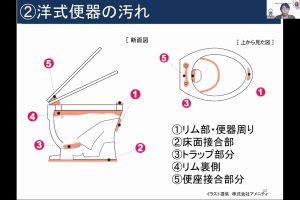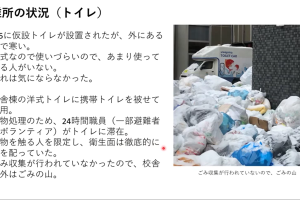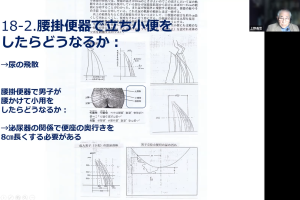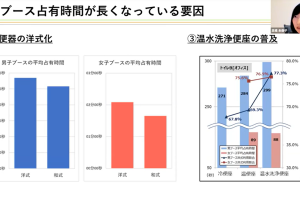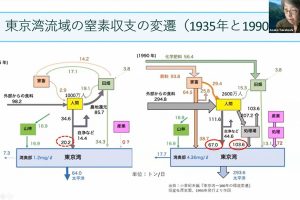Date: 14 September 2023 (Thu) 18:00-20:00 JST
- Master of Ceremony (MC);
- Yoshihiko Kawauchi,Ph.D. A steering committee member of JTA, former professor of Toyo university.
- Presenters
- Presenter 1; Why Diaper-Free Childcare now?-What is happening to children due to the long-term and extended use of the disposable diapers
Ms. Tomoyo Wada, Director of the Diaper-Free Childcare Institute - Presenter 2; Child development and excretory support.
Ms. Yachiyo Murakami, Associate Professor of Tokiwa Junior College
- Presenter 1; Why Diaper-Free Childcare now?-What is happening to children due to the long-term and extended use of the disposable diapers
1. Why Diaper-Free Childcare now? -What is happening to children due to the long-term and extended use of the disposable diapers
(Wada) I am currently a freelancer and working in the field of the child nursing support. My work is a communication between the parents and children. I teach a variety of courses and give lectures, and write for the childcare, health and medical magazines.
I worked as a nursery school teacher in my 20s. I was involved for 20 years from my 30s to 40s in the international cooperation in the field of “maternal and child health,” improving the health of babies and mothers in Asia, Africa and Latin America.
I am currently belonging to “Diaper-Free Childcare Institute” which aims to create a society that values the dignity of the excretion during the whole life from babies to the elderly. (https://www.omutsunashi.org/)
Our idea is that the babies are forced to wear the diapers not for the baby, but because adults would be in trouble if the house or clothes were soiled with the baby excrements. Many babies grow up without diapers in the global south countries in Asia and Africa, especially in rural areas.
Japan used to be the same way.
Babies actually dislike the diapers. They move their bodies happily when their diapers are removed. I think there are still more babies in the world who are growing up without the diapers. The toilet training is practiced in Japan when the babies graduate from the diapers, but in reality, it must be not necessary.
I carried out a survey in a small island with a population of about 600 off the coast of Cebu Island in Philippines. The disposable diapers are now used even in rural areas in Asia and Africa. However, they are expensive and babies still do not use the diapers in many places. Even in such a situation, the mothers do not get covered in their babies’ excrement when holding their babies.
When holding the baby, the mother can sense when the baby wishes to excrete and let to makes it on the spot. In this way, babies grow up excreting in a natural open space. Then, once they grow up one year old and can walk, they will go outside the house and excrete by themselves. They will also know where to do. Once they experience this manner, they become to achieve the complete independence in the excretion.
In the rural areas of these developing countries, there is no custom to do toilet training, or the concept of it does not even exist. The children of the human kind do not wear the diapers and excrete naturally like the animals. They gradually develop the physical sense to control the excretion by storing and releasing it. As the sociality begins at the end of the first year, they will imitate the behaviour of those around them and become able to excrete in the toilet. This must be a way that a child shall grow up. They will naturally be able to excrete in the toilet without the toilet training. Once it used to be the same way in Japan.
There are two important points to being able to use the toilet. One is the development of the bodily sense of the storing urine before releasing it. The other is being able to use the toilet as the social development. These are two completely separate matters.
Regarding the development of the bodily sense, firstly it means storing up the urine once and then releasing it in the open space. In order for this to do, the development of both senses is required. One is the sense of the inside of the body named the interoception. This is the sense that inform when the urine has accumulated in the bladder.
The other is the senses felt outside the body, called the exteroception by the five senses. The brain detects that the urine has accumulated in the bladder when these two senses are integrated in the brain. However, instead of letting it flow out immediately, the brain orders to store it and then release it at an appropriate place. This physiological sense is independent of the intellectual development.
For example, even if a child has an intellectual disability, the development of the ability to urinate is not significantly delayed. Alongside the development of the physical senses, another important thing is the development in the sociality. This means being able to defecate in places designated by the society such as a toilet. The physical senses develop first, and then the sociality development follows.
In other words, when a child’s physical senses are well developed, they will naturally be able to use the toilet by imitating the behaviours of others. A child in Japan becomes independent in the excretion at around 3 and a half years old when they do not need the diapers during the day. A generation ago in Japan, its age was around 2 years old. This is coincident with the children in developing countries who do not use diapers.
My mother’s maternal and child health handbook of 60 years ago informed that the children would notify the sign of the urinate and defecate around 1 year and 6 months if they were well disciplined. I think this probably meant that the children shall be trained in a way that is refraining from a habit of defecating in a diaper. Then why is toilet training such a difficult task in Japan nowadays?
One of the top three concerns of the parents for their children today is that their children keep wearing the diapers. There is an increasing number of children who are unable to remove diapers during the day even when they enter elementary school. The reason is obvious that the children are used to urinate in the diapers for many years after their birth.
Consequently, the child will be lost the natural sense of the urinating outside of the diaper. Furthermore, because the child can defecate anytime, the child cannot have the sense of storing the urine in the bladder.
The parents become quite distressed since the potty train doesn’t work when they are even at the age of 3 or 4. It becomes difficult because the parents try to get their children to use the toilet straight away, skipping the development of their physical senses.
The exteroception is particularly important during the development of the bodily senses. It is necessary to recognize the excrement coming out of the body. When wearing a diaper, it cannot be seen the excrement coming out. This is a fundamental problem.
They have never heard the noise of the excretion. This state continues for three or four years after birth, then their brains are unable to recognize what is the excretion. Furthermore, it has psychologically safer for the children to excrete in a diaper for many years after birth.
As a result, some child may still be unable to use the toilet, even though the child is over three years old although can speak normally. The toilet training is not compulsory. It can be chosen whether or not to do it or how to do it. The babies of only a few months old used to urinate when their diapers are opened for a change. This is the original, natural behaviour of humans as animals. We are born with the innate ability to urinate in an open space.
However, adults will use them let to excrete in the diaper, and cover with the diaper. The babies learn that the excretion should be done inside the diaper. When they become the age of one, they gradually stop urinating when the diaper is open as they are raised like this. Then one day, when they are two or three years old, the parents order them suddenly, “You shall excrete in the toilet, not in the diaper.”
By that time, the child has become accustomed to excreting inside the diaper and has almost lost the ability to excrete without it. Therefore, the child must relearn how to excrete outside the diaper. If this relearning process does not go well, it must be difficult to remove the diaper. On the other hand, if the child rarely uses the diapers, excrete in an open space, and is constantly aware of the excretion with the five senses, the child will naturally become independent in the excrement.
Unlike the “Without Diaper” method used for children growing up in rural areas of Africa and Asia, there is a method where the child usually wears a diaper, but only when they excrete, the diaper is removed and the child will excrete in an open space. This is called “Diaper-Free Childcare.” Since the diapers are still used, so I think the exact name would be “Childcare that does not rely too much on the diapers.” This method can be applied housing environment like those in Japan.
One of the side effects of using the diapers for a long period of time is that it makes to postpone the independence. We looked at an old parenting magazine to find out at what age babies start this training. The babies were removed a diaper around six months after birth up about 80 years ago. Whereas, a disposable diaper manufacturer surveyed in 2009 that the average age of the stop to use the diapers was 40 months (3 years and 4 months).
Nowadays, many children are suffering from the constipation. It can be pointed out that one of the causes may be the long-term use of the disposable diapers.
This is not unique situation in Japan, but there are similar reports from overseas, particularly from the developed countries that there is an increasing number of the children leaking during the day, even though they have no apparent disabilities. Another problem is that the disposable diapers are too heavy when used for long periods of time.
As disposable diapers have become more efficient and can absorb large amounts of the urine, the parents are going without changing them for long periods. As a result, more children are walking around wearing heavy disposable diapers. It has been pointed out that this puts a strain on children’s legs and backs, and becomes problems for them to develop.
Another problem is a deterioration in parent-child relationships as the children are still wearing diapers even when they grow up. An increasing number of the parents may be abusing their children or having trouble raising them.
In recent years, there are a few reports every year that the parents being arrested for abusing their children because they were late in the potty training. However, this is only a tip of the iceberg, and I am also receiving many inquiries from mothers about their concerns. In such a background, I have recently published an e-book titled “The final book to read when you think your child is still using the diapers even after 3 years old!”
As mentioned above, the childcare that shall not rely too much on the diapers is called as “Diaper-Free Childcare” in Japan. This has been common during the days of using the cloth diapers before the disposable diapers. The washing the cloth diapers was a hassle, and then the parents wished the less wet diapers would be ideal. Also, children are less likely to be suffering from the diaper rash or become constipated when they excrete naturally rather than inside the diaper. It was encouraged the children to excrete without the diapers in early days.
It is important to keep in mind that the natural human sense of the excreting in an open space. This can be possible in a potty, a toilet, or even in the yard at home. “Diaper-Free Childcare” is about letting your baby experience the natural manner that happens to an animal in the open, without a diaper.
It becomes a certain time base when a baby is likely to excrete. These times are when they wake up, released after being tightly held by being carried on the baby’s back, or the diaper is released. At that time, you remove the diaper for the baby.
Young babies may cry when they want to urinate. It is necessary to recognize exactly this signal. There are actually many other signals. They may change depending on the baby and their age. It is required to pay attention to them carefully. “Diaper-Free Childcare” does not always mean that let a baby urinate without using the diapers. It is about not interfering of a child’s natural excretory ability. ” Diaper-Free Childcare ” also does not reject the use of the disposable diapers.
Nowadays many people are concerned about the cleanliness, sterilization, and disinfection. The disposable diapers have become the essential items. It is important to think about how to use the disposable diapers without impeding the development of a child’s innate excretory ability.
The fact that “Diaper-Free Childcare” is currently getting attention is it admits the people in socially vulnerable positions, such as babies or elderly, to excrete comfortably throughout of their whole life. In other words, this is of the gradually increasing number of people who think and value the dignity of the excretion.
2; Child development and excretory support
(Ms. Yachiyo Murakami)
The time when children are independent in the excretion is becoming later in comparison with1960s. The lifestyles in Japan have changed a lot from the 1960s, and this has had a major impact on the children’s development. The similar thing can be said about their excretion. For example, the housing conditions have changed a lot compared to the past, and there are fewer yards where children can easily excrete at the outdoors.
In the past, the parents carried their children on their back or in their parents’ arms, they were able to physically sense their child’s wish to defecate and respond sensitively. Whereas nowadays, they are often carried in the strollers or left to sleep in cribs. Even when they are together, there is less chance to physically touch each other.
At a survey by asking to the nursery school teachers about the support they provide for defecation at the school. The most common answer was that the children become independent in defecation during 2.5 or 3 years old.
The disposable diapers are often cited as a cause of the delayed independence in excretion. However, no research has revealed any relationship on the disposable diapers. I think there are more complex factors involved behind. There is no longer necessary to change diapers as frequently as before, with the widespread use of the high-quality disposable diapers. Nowadays, it is becoming more difficult to the physically detect movements that indicate a child’s wish to excrete. Then how do the parents and teachers detect their children’s signals to excrete?
We asked the teachers to use a potty and observe how the child shows signals of the urination, when changing diapers at one nursery school. A 9-month-old girl was able to urinate in the potty within two weeks of starting this trial. She was able to urinate when she sat down after being able to do it once. The teachers closely observed the child’s facial expressions and movements and were able to analyze the facial signals and movements when the child urinates. For example, the child may stare at her crotch or purse the mouth before urinating.
The teacher notices this behaviour and says to the child, “It looks like you’re going to pee.” The child realizes that “This is a feeling.” This kind of interaction is important in helping children learn to control their excretory senses. For a child to be able to say “I wish to pee” in words, the teacher must first have a communication by empathizing with the child’s senses and talk on behalf to convey that feeling.
The teachers who carried out this trial reported that the children who had successful the excretion were able to eat their meals more smoothly and speak more. An attachment must be formed between the teacher and the child by sharing the pleasure of the successful excretion. It is thought that this creates a virtuous cycle where the children will try to eat at lunch because they want to be praised by the beloved teacher.
The interactions between the teacher and child when the excretion pushes the child’s ability to understand the intentions of others and forms the elementary parts of language. Sharing the senses of the excretion equals to share the feelings of the internal organs. This type of sharing cannot arise through only changing of the diapers. I surveyed about when children began using a potty. The results showed that the earlier children started using a potty, the sooner they became independent in the excretion.
I think the reason is that using a potty makes the teachers more aware of when their child wishes to defecate.
The teachers ask frequently the child to choose whether to sit on the potty or not, and whether to defecate or not, when using a potty. It can be said that the child has the initiative when it comes to excretion, and understands that can make by the own decision. This situation will give the child a sense of the self-efficacy and foster to control the own body. It is becoming clear that the important thing is not how quickly children start using the potty, but the quality of the dialogue between the teacher and the child.
【Q&A】
(Q1: Kawauchi) Please explain the relations between the increasing of the constipation of the children and using the diapers.
(A1: Wada) I haven’t seen any research papers on this yet, but I’ve come to believe so in the 15 years of my work experience. One of the reasons that the babies get constipated is that they don’t want to defecate in the diapers, and they will patient to defecate. Many babies are found that their constipation improves when they are taken off the diapers and started to defecate in a potty or toilet.
An old magazine for the housewives also informed that babies are less likely to become constipated when they remove the diapers when defecate. There is no problem with putting a disposable diaper at the baby sleeping. Even the people who call “raising their babies without diapers” also use diapers at night. However, some babies who are raised “Diaper-free” cry even in the middle of the night to let us they need to urinate.
(Q2: HO) What is the difference between “Toilet Training” and “Ben-iku?”
(A2: Murakami) I think that “Ben-iku” must be a word which I first proposed. It started with an activity where I talked to the children about the importance of the defecation for the response to the problem of the elementary school children being too embarrassed to defecate at school. Toilet Training is a training for children who used to wear the diapers and learn to use the potty or toilet and not to leak without the diaper.
There is no exact definition of Ben-iku yet. For instance, it is about acquiring the knowledge and habit of being able to check one’s own health condition from the looking at the excretion. The excrement contains many information about the body’s health condition by the colour, shape, and smell.
Such as “Shokuiku”: Food Education, it is not only the nutritional matters but also observing how vegetables grow in the fields and this is also part of the education. It would be good if “Ben-iku” could also cover a wide range of the matters.
(Q3: Kawauchi) It was explained there is skin-to-skin contact between the parents and babies. In developing countries, making it easy to sense when a baby needs to defecate that by the parents responding to this. The baby will develop the sense of the defecation. However, I am concerned that more women enter the workforce, won’t there be fewer opportunities for the constant close contact between the children and parents?
(A3-1: Wada) The relationship with the parents on the excretion is important from the birth until about one year old. Nowadays, many workers are accustomed to take one year of the parental leave. The experience will remain upon the child when a relationship is built during that time. The teacher will keep the childcare that does not rely too much on the diapers at the nursery even after the parental leave ends. However, some nursery schools do not do the same way as at home since the diapers are easier for them to manage. The communication through excretion will keep well, while the child still be allowed to defecate in an open space while at home.
(A3-2: Murakami) It is favourable when the teachers treat the children when they use the potty, even if it is only occasionally. I think this will be kept in the experience for the child.
(A3-3: Wada) The key point is that this is not a training. The key is to educate the baby as early as possible after the birth that it is not forced to learn the excrement in a diaper. When the parents happen to recognize the baby wishing to excrement, they will take it easy and simply remove the diaper and let the baby excrete. Sharing senses with the baby will lead to be joyful.
(Q4: TE) My child is 3 years old but still wears diapers. What should I do?
(Q1: Kawauchi) Please explain the relations between the increasing of the constipation of the children and using the diapers.
(A1: Wada) I haven’t seen any research papers on this yet, but I’ve come to believe so in the 15 years of my work experience. One of the reasons that the babies get constipated is that they don’t want to defecate in the diapers, and they will patient to defecate. Many babies are found that their constipation improves when they are taken off the diapers and started to defecate in a potty or toilet.
An old magazine for the housewives also informed that babies are less likely to become constipated when they remove the diapers when defecate. There is no problem with putting a disposable diaper at the baby sleeping. Even the people who call “raising their babies without diapers” also use diapers at night. However, some babies who are raised “Diaper-free” cry even in the middle of the night to let us they need to urinate.
(Q2: HO) What is the difference between “Toilet Training” and “Ben-iku?”
(A2: Murakami) I think that “Ben-iku” must be a word which I first proposed. It started with an activity where I talked to the children about the importance of the defecation for the response to the problem of the elementary school children being too embarrassed to defecate at school. Toilet Training is a training for children who used to wear the diapers and learn to use the potty or toilet and not to leak without the diaper.
There is no exact definition of Ben-iku yet. For instance, it is about acquiring the knowledge and habit of being able to check one’s own health condition from the looking at the excretion. The excrement contains many information about the body’s health condition by the colour, shape, and smell.
Such as “Shokuiku”: Food Education, it is not only the nutritional matters but also observing how vegetables grow in the fields and this is also part of the education. It would be good if “Ben-iku” could also cover a wide range of the matters.
(Q3: Kawauchi) It was explained there is skin-to-skin contact between the parents and babies. In developing countries, making it easy to sense when a baby needs to defecate that by the parents responding to this. The baby will develop the sense of the defecation. However, I am concerned that more women enter the workforce, won’t there be fewer opportunities for the constant close contact between the children and parents?
(A3-1: Wada) The relationship with the parents on the excretion is important from the birth until about one year old. Nowadays, many workers are accustomed to take one year of the parental leave. The experience will remain upon the child when a relationship is built during that time. The teacher will keep the childcare that does not rely too much on the diapers at the nursery even after the parental leave ends. However, some nursery schools do not do the same way as at home since the diapers are easier for them to manage. The communication through excretion will keep well, while the child still be allowed to defecate in an open space while at home.
(A3-2: Murakami) It is favourable when the teachers treat the children when they use the potty, even if it is only occasionally. I think this will be kept in the experience for the child.
(A3-3: Wada) The key point is that this is not a training. The key is to educate the baby as early as possible after the birth that it is not forced to learn the excrement in a diaper. When the parents happen to recognize the baby wishing to excrement, they will take it easy and simply remove the diaper and let the baby excrete. Sharing senses with the baby will lead to be joyful.
(Q4: TE) My child is 3 years old but still wears diapers. What should I do?
(A4: Wada) Even though the child is over three years old with understanding words, it will not work well if the child does not develop the physical sense of the storing excrement in the urinate bladder and defecating outside the diaper. Start by having the child defecate in the open space beside the diaper. Watch the child to urinate together and empathize with the physical senses.
